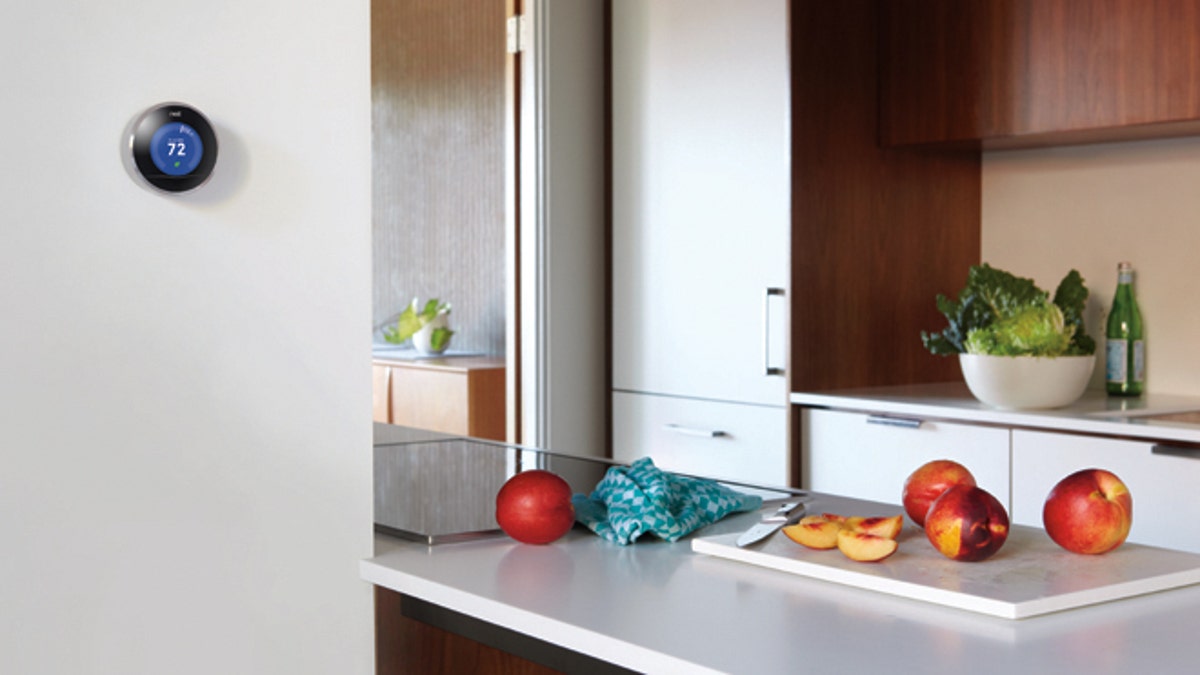
A Nest smart thermostat is seen on the wall of a kitchen. (Nest / Aya Brackett)
Paying $3.2 billion for anything, even a trip to Mars on gossamer wings, may seem ludicrous, audacious, even just plain stupid. But Google's purchase this week of Nest for that princely sum may be the wisest investment the company has made in a long while.
Nest has only two products on the market, a $249 thermostat and a $249 smoke and CO detector. Hardly the stuff of platinum-lined high-tech dreams. But Nest has something else: a unique vision. The company, created by some of the people that brought the iPod and iPhone to market, wants to make dumb devices in the home smart, and in the process save energy, lives, and make the mundane task of dealing with systems like heating and home security more convenient.
Nest's thermostat has a very sensitive Wi-Fi transceiver to connect to home networks, and it runs forever on a trickle charge, replacing old-school mercury-filled thermostats without extra wires, tools or even having to cut new holes in a wall. It can be controlled with an app and learns your habits, automatically adjusting heat and cooling accordingly. After testing more than a dozen programmable thermostats, it's by far the easiest I've tried to install and set up, no question.
But even before Nest introduced its first product, founder and CEO Tony Fadell made it clear to me over a lunch meeting that the company was after much more: a smarter, connected world of things. That means locks that can be remotely opened (or set with new key codes), ovens that can be checked from the office (did I remember to turn it off?) and even sprinkler systems that detect drought and automatically come on at night.
Dubbed the Internet of Things -- a slew of companies from home security specialists to retailers and major consumer electronics firms -- are racing to enter what was once laughingly called the home automation market (home "breakdown" was more like it).
Lowe's has its Iris family of locks, thermostats, motion sensors and cameras, for example. AT&T has been pushing its own home security service. Belkin has a family of WeMo switches and devices including a new Crockpot that can be controlled online using an app. And LG and Samsung debuted their own Internet connected things at last week's CES show, including an LG HomeChat washer that you can text ("Are you washed up yet? LOL").
While all this George Jetson gear may sound like a house husband's dream, the truth is that it is far from being a reality. A rat's nest of independent systems, standards and competing wireless designs (Z-Wave, ZigBee, Wi-Fi, et al) has crippled the market. Automated locks, for example, that recognize you and open automatically, don't work with thermostats that can be remotely controlled. Sure there's an app for that; the problem is there are hundreds of apps for that.
Nest is one among many competitors in the Internet of Things, but it has done an excellent job making its first two products work properly and easily. If it can coordinate more devices (home door locks, for example, and lights are rumored to be the company's next products) and become more integrated with Google's popular Android smartphone software, it has a chance of becoming a de facto standard for every single device that uses (or could use) electricity in the home.
Whoever manages to come up with such a standard, easy way of connecting all these devices online could dominate everything from home security to HVAC, forcing electronics firms to pay (say, Google) a licensing fee.
Of course, the home automation market is rife with failures. Overly expensive unreliable systems that could only be mastered by professional installers are legion. Making such systems plug-and-play simple is a complicated job. It took Nest a long time to learn about thermostats and make them work with heat pumps, for example. A Nest employee at CES admitted that it's been "painfully slow" going getting additional Nest products to market. Reinventing home hardware that has remained largely unchanged for 50 years isn't easy.
Some analysts have raised privacy concerns over Google owning a company whose products sit in your home and monitor people's comings and goings ("Look how much electricity that Quain fellow is using!"). However, Google and countless other companies already do that using smartphones and even in-car systems.
Certainly, Google and Nest will have to make their security tighter than, say, Target or Neiman Marcus' systems to garner consumer's trust. But the first step is making old hardware smart and simple to use -- and Nest has already proven it can do that.
Follow John R. Quain on Twitter @jqontech or find more tech coverage at J-Q.com.
